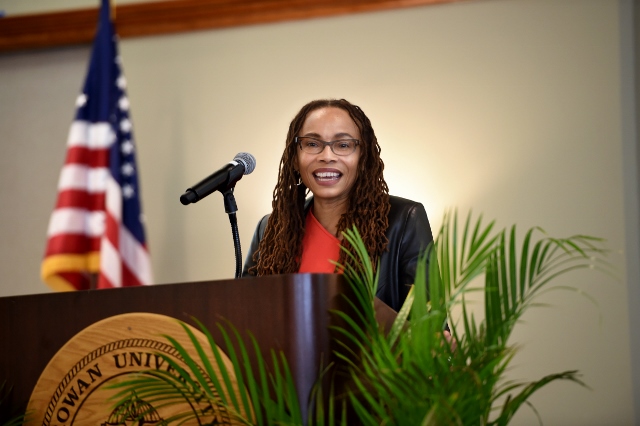MLK Day speaker: Healthcare inequality is the most inhumane
MLK Day speaker: Healthcare inequality is the most inhumane

Addressing some 250 attendees during Rowan University’s annual Dr. Martin Luther King, Jr. Scholarship Breakfast Jan. 15, entrepreneur, philanthropist, author and distinguished University of Pennsylvania Professor Dorothy E. Roberts spoke to the long-simmering issue of healthcare in America, in particular how the delivery of it has been affected by race and racism.
Roberts cited Dr. King in noting that, of all the inequalities that America has wrestled with, few have been more troubling and consequential than the inequality in healthcare because the lifesaving benefits of medicine, science and technology have never reached as many Americans as they might have simply and tragically because of race.
Flanked by images on two screens in the Eynon Ballroom of giant jetliners, she said “imagine if every day a jumbo jet carrying 230 African Americans crashed. That’s exactly the damage caused by racial inequality.”
Citing studies from America’s recent and distant past, Roberts said the nation’s history is rife with examples of medical practitioners withholding care from minority patients or, worse, using them for experimental treatments.
For example, she referenced Dr. J. Marion Sims, known as the “father of modern gynecology,” whose work was advanced by experiments on unanesthetized African-American slaves. And she noted the work of Dr. Samuel Cartwright, a Civil War-era physician, who promoted the idea of “Negro medicine” and the notion that slavery was actually good for Africans.
Unfortunately, Roberts said, there remains great inequality in healthcare and examples include statistics that show black women are four times more likely to die of pregnancy-related causes in America than white women.
She also referenced a Chicago study that showed white women in that city are two times more likely to get breast cancer but black women are four times more likely to die from it.
“And why is that? A study has shown that white women over the past 25 years were more able to take advantage of early detection and treatment (than black women),” she said.
Roberts did not suggest that all medical practitioners, past and present, are or have been racist, but noted, as Dr. King did, that American history has included not only flagrant racism but racism in other forms, such as in the practice of medicine.
She said King, who would have turned 89 on the holiday that celebrates his life, “was not speaking out against science and technology but against a society that determines who may benefit from science and technology based on race.”
The program was Rowan’s 32nd , an annual event that supports high achieving students through the William H. Myers Scholarship fund. Myers, who for 22 years was an Equal Opportunity Fund counselor at Rowan, became assistant dean of students in 1999. He mentored hundreds of Rowan students during his 26 years at the University before his untimely death in 2003.
This year’s program included comments by U.S. Senator Robert Menendez, U.S. Representative Donald Norcross and Rowan President Dr. Ali Houshmand and was hosted by Vice President for Student Life and Dean of Students Richard Jones.
Considering the turbulent political times America now finds itself in, Menendez quoted King’s last speech in Memphis to describe his reasons for staying optimistic.
“Only when it is dark enough can we see the stars,” he said.
Educated at Yale University and Harvard Law School, Roberts is the 14th Penn Integrates Knowledge Professor with joint appointments in the Departments of Africana Studies and Sociology and the Law School where she holds the inaugural Raymond Pace and Sadie Tanner Mossell Alexander chair. She is also founding director of the Penn Program on Race, Science & Society in the Center for Africana Studies.
She was elected to the National Academy of Medicine in 2017 and is the author and editor of numerous books, most recently Fatal Invention: How Science, Politics and Big Business Re-Create Race in the Twenty-First Century (The New Press, 2011).